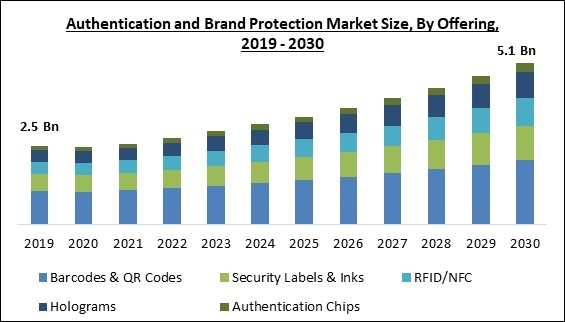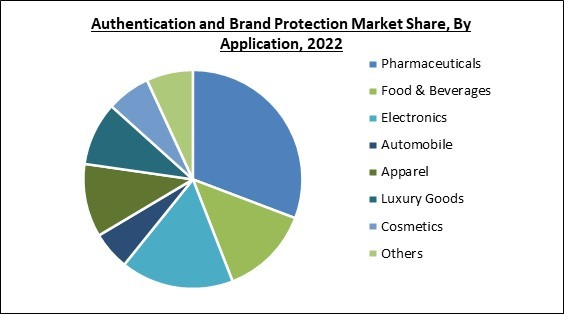RFID tags have become useful instruments for choosing products. RFID recognizes and tracks tags attached to things using electromagnetic fields to quickly identify materials. The RFID/NFC segment registered $435.3 million revenue in the market in 2022. As the use of this technology in the pharmaceutical sector increases, it helps to track and improve the supply chain system, which includes manufacturing, distribution, and retail stores. Some of the factors impacting the market are Increasing online retail platforms and online consumers, rising adoption of technologies for tracking and tracing, and limitations posed by already available technologies.
Product makers frequently run separately operated online retail stores these days. Customers can access information on product debuts, features, samples, prices, and other pertinent product details through these stores. The wide selection of goods and affordable prices provided by e-commerce websites, which encouraged more customers to choose online buying, are responsible for the boom in online shopping. The growth of e-commerce and international trade has made counterfeit goods a serious issue for firms. Solutions for brand protection and authentication aid businesses in thwarting counterfeiting and preserving their reputations. Additionally, for supply chain traceability, several cutting-edge technologies are deployed, including blockchain. Blockchain works like a database, storing data in a digital ledger of distinct blocks that are added to as new transactions are made. With the help of traceability technology, users can access the complete supply chain's detailed data, which provides insightful information that can be put to use. Users can scan product photos and upload them to a company's website to verify the product's authenticity via remote authentication. Therefore, these factors contribute to the market's growth. As a result, the demand for authentication and brand protection solutions is expanding as more businesses invest in systems that can monitor and remove counterfeit products posted on online marketplaces.
However, conventional authentication methods like RFID, barcodes, and holograms have inherent flaws that counterfeiters can exploit. For instance, 2D codes, such as QR codes, are simple to copy. When a QR code is simply copied, its functionality is duplicated, making it challenging for readers to distinguish between the original and copied codes. Holograms include detailed details, complex structures, and difficult-to-replicate reflecting properties. Smaller companies could find it difficult to defend expenditure, particularly if a quick or certain return on investment (ROI) is not promised. All of these factors could slow the market's expansion.
Offering Outlook
By offering, the market in segmented into security labels & inks, holograms, barcodes & QR codes, RFID/NFC, and authentication chips. The security labels and inks segment garnered a remarkable growth rate in the market in 2022. Security labels and inks are materials created to increase the reliability and security of goods, papers, or packaging. Their main objective is to prevent forgery, tampering, and unauthorized handling. If an attempt is made to remove or alter the labels, they will display tampering or alteration.Application Outlook
Based on application, the market is categorized into electronics, pharmaceuticals, automobile, food & beverages, apparel, luxury goods, cosmetics, and others. The pharmaceuticals segment acquired the highest revenue share in the market in 2022. Authentication and brand protection are essential in pharmaceutical applications because fake pharmaceutical items endanger patients' health and damage the reputation of pharmaceutical companies.Technology Outlook
Based on technology, the market is divided into overt, covert, digital, and forensic. The covert segment procured a considerable revenue share in the market in 2022. Security elements that are covert anti-counterfeiting are not obvious to the naked eye. It typically takes some form of equipment, such as specialized lighting, specialized readers, magnifying glasses, or other similar devices, to verify an unseen authentication feature. Additionally, covert anti-counterfeiting security features are thought to be more secure.Authentication Mode Outlook
On the basis of authentication mode, the market is bifurcated into smartphone and blockchain. The smartphone segment recorded a significant revenue share in the market in 2022. Consumers can easily and conveniently confirm the legitimacy of a brand's items using smartphones for product authentication. Brands have developed a dependable and secure method to distinguish real products from counterfeits and spot any instances of product diversion by deploying smartphone-based authentication solutions.The leading players in the market are competing with diverse innovative offerings to remain competitive in the market. The above illustration shows the percentage of revenue shared by some of the leading companies in the market. The leading players of the market are adopting various strategies in order to cater demand coming from the different industries. The key developmental strategies in the market are Acquisitions, and Partnerships & Collaborations.
The market research report covers the analysis of key stake holders of the market. Key companies profiled in the report include Authentix Inc., Avery Dennison Corporatio, Brady Corporation, De La Reu plc, WISeKey International Holding Ltd, Infineon Technologies AG, Merck KGaA , Assa Abloy AB, Centro Grafico DG and Optel Group.
Regional Outlook
Region-wise, the market is analyzed across North America, Europe, Asia Pacific, and LAMEA. The North America segment procured the largest revenue share in the market in 2022. One of the key areas for North America's market is the food and beverage and pharmaceutical applications. The focus of numerous North American businesses is developing unique authentication and brand protection technology. One of the important aspects influencing the regional market is the existence of key competitors, combined with a sizable consumer base. Additionally, laws and policies in the region's nations to stop counterfeiting operations have encouraged market expansion.Strategies Deployed in the Market
- Jun-2023: De La Reu plc unveiled 'The Explorer', a passport bio-data page as part of the ID Security Solutions product line in the Authentication division. The launched product would consist of a portfolio of innovative new design details and security attributes, like a tamper-proof fringe hinge, a woven thread that is intricately woven within the polycarbonate layers, and complete edge-cut technologies.
- Feb-2023: Infineon Technologies AG collaborated with TrustSEC, a leader in information security and smart cards. Under this collaboration, both companies would launch BIO-SLCOS, an advanced smart card operating system. Additionally, the operating system makes advantage of Infineon's most recent high-performance SLC38 Secure Element to offer a protected and open platform that would combine the finest in security, flexibility, and hardware independence to satisfy the needs of the worldwide smart card industry for comfort, performance, and security.
- May-2022: Avery Dennison Corporation released AD Medio Web DF EM4425 and AD Web DF EM4425 V12 inlays and tags in its Dual-frequency range of RFID inlays. The launched product would be developed for supply chain management, brand protection, and customer engagement.
- Mar-2021: Avery Dennison Corporation introduced Circus Pro and Circus Pro Flex NFC inlays, characterized by the latest high-performance Web Authentication em|linq (EM4332) chip. The launched product would allow secures, end-to-end brand protection solutions which would require an encrypted digital "birth record" for packaged products, a reliable product identity validation service, and platform-agnostic consumer engagement abilities for clients inside Consumer-Packaged Goods, Food and Beverage, Apparel and Beauty markets.
- Jul-2021: Authentix Inc. took over Strategic IP Information Pte Ltd, a leading online brand and content rights protection provider. Under this acquisition, Authentix Inc. would widen its suite of digital security technologies to add online anti-counterfeiting and content rights solutions and maximize the scope of its portfolio for its brand protection clients. Additionally, the integration of both online investigation and copyright protection services is a key component of Authentix's growth plan, and SIPI is a high-caliber organization that would perfectly fit with Authentix's capabilities and strategic direction.
- Feb-2021: De La Reu plc introduced DLR Validate, a smartphone-enabled hologram validation tool. The launched product would support authorized brand protection inspectors to search the holographic attributes in a PURE or IZON holographic label to confirm if the hologram would be genuine.
- Sep-2020: Authentix Inc. completed the acquisition of the Traceless Authentication Group, a subsidiary of Bibliotheca, Inc., a library systems solutions firm serving over 30,000 libraries globally. This acquisition would widen Authentix Inc.'s security technology portfolio available for a growing list of its worldwide clients together with the Traceless customers.
- Oct-2020: Avery Dennison Corporation came into partnership with Certilogo, the digital authentication platform. This partnership aimed to combine Certilogo’s digital technologies with Avery Dennison’s apparel labeling products, enabling consumers to check product authenticity through their smartphones, hence unlocking personal experiences with brands.
- Aug-2020: Assa Abloy AB took over Access-IS, a leading provider of electronic RFID, NFC, and barcode devices. Following this collaboration, ASSA ABLOY would strengthen its latest portfolio within widened access technologies and would offer complementary growth opportunities.
- Apr-2019: De La Reu plc announced the launch of PureImage, the latest customizable holographic security thread. The launched product would be a highly bright holographic thread with clear imagery and bold movement for easy authentication and instant user authentication.
Scope of the Study
Market Segments Covered in the Report:
By Offering
- Barcodes & QR Codes
- Security Labels & Inks
- RFID/NFC
- Holograms
- Authentication Chips
By Application
- Pharmaceuticals
- Food & Beverages
- Electronics
- Automobile
- Apparel
- Luxury Goods
- Cosmetics
- Others
By Technology
- Overt
- Covert
- Digital
- Forensic
By Authentication Mode
- Blockchain
- Smartphone
By Geography
- North America
- US
- Canada
- Mexico
- Rest of North America
- Europe
- Germany
- UK
- France
- Russia
- Spain
- Italy
- Rest of Europe
- Asia Pacific
- China
- Japan
- India
- South Korea
- Singapore
- Malaysia
- Rest of Asia Pacific
- LAMEA
- Brazil
- Argentina
- UAE
- Saudi Arabia
- South Africa
- Nigeria
- Rest of LAMEA
Key Market Players
List of Companies Profiled in the Report:
- Authentix Inc.
- Avery Dennison Corporation
- Brady Corporation
- De La Reu plc
- WISeKey International Holding Ltd
- Infineon Technologies AG
- Merck KGaA
- Assa Abloy AB
- Centro Grafico DG
- Optel Group
Unique Offerings
- Exhaustive coverage
- The highest number of Market tables and figures
- Subscription-based model available
- Guaranteed best price
- Assured post sales research support with 10% customization free
Table of Contents
Companies Mentioned
- Authentix Inc.
- Avery Dennison Corporation
- Brady Corporation
- De La Reu plc
- WISeKey International Holding Ltd
- Infineon Technologies AG
- Merck KGaA
- Assa Abloy AB
- Centro Grafico DG
- Optel Group











